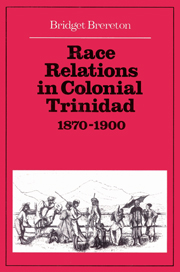Book contents
- Frontmatter
- Contents
- Acknowledgements
- Glossary
- 1 Introduction
- 2 The environment
- 3 The white elite
- 4 Education and mobility
- 5 The rise of a coloured and black middle class
- 6 The urban labouring population
- 7 The black rural masses
- 8 The souls of black folk
- 9 The Indians
- 10 Racism and race relations: the divided society
- Abbreviations
- Notes
- Bibliography
- Index
4 - Education and mobility
Published online by Cambridge University Press: 08 October 2009
- Frontmatter
- Contents
- Acknowledgements
- Glossary
- 1 Introduction
- 2 The environment
- 3 The white elite
- 4 Education and mobility
- 5 The rise of a coloured and black middle class
- 6 The urban labouring population
- 7 The black rural masses
- 8 The souls of black folk
- 9 The Indians
- 10 Racism and race relations: the divided society
- Abbreviations
- Notes
- Bibliography
- Index
Summary
Since the emancipation of the slaves in 1838, a black and coloured middle class had been slowly emerging in Trinidad, as in the West Indies as a whole. Some of these people were descended from the ‘free coloured’ class of slavery days. Others were the descendants of ex-slaves, or immigrants from Africa and the eastern Caribbean. The later nineteenth century was an important period for the gradual growth of this middle class, for it was in these years that black and coloured men began to acquire secondary education to any extent, and to enter teaching, the professions, and the civil service. Most members of the non-white middle class were employed in white-collar jobs; they were teachers, minor civil servants, journalists and printers, pharmacists, doctors, solicitors, barristers, and clerks. Education was the key to all these occupations, the crucial factor in the gradual emergence of a coloured and black middle class. Although some coloured men had inherited middle-class status, being the descendants of prosperous free coloured families established before 1838, most were self-made men, or the sons of self-made men, who had achieved middle-class status mainly through the schools.
It is essential, therefore, to examine the system of public education which existed in Trinidad in the later nineteenth century. We will need to know how efficient the schools were and what proportion of school-age children attended them. We must consider how far the system was open to lower-class children, especially at the secondary level, and how far it facilitated the upward mobility of black and coloured youth.
- Type
- Chapter
- Information
- Race Relations in Colonial Trinidad 1870–1900 , pp. 64 - 85Publisher: Cambridge University PressPrint publication year: 1980



